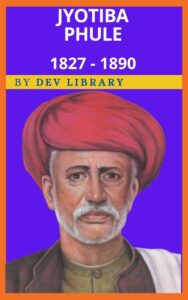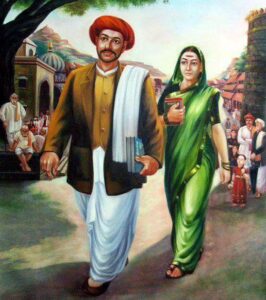
Table of Contents
Mahatma Jyotiba Phule Jayanti 11 April
 Mahatma Jyotiba Phule Jayanti is celebrated on April 11th every year to honor the birth of Mahatma Jyotiba Phule, one of India’s greatest social reformers, who made significant contributions to the upliftment of the oppressed, particularly women and lower-caste communities. Born in 1827 in Pune, Maharashtra Phule is best known for his pioneering work in education and social reform.
Mahatma Jyotiba Phule Jayanti is celebrated on April 11th every year to honor the birth of Mahatma Jyotiba Phule, one of India’s greatest social reformers, who made significant contributions to the upliftment of the oppressed, particularly women and lower-caste communities. Born in 1827 in Pune, Maharashtra Phule is best known for his pioneering work in education and social reform.
Mahatma Jyotiba Phule worked tirelessly to challenge the caste-based discrimination and social inequalities that were deeply ingrained in Indian society. He believed that education was the key to eradicating societal barriers and he founded the first school for girls in Pune in 1848. He also established the Satyashodhak Samaj (Society of Truth Seekers) in 1873, which aimed to promote social justice and equality.
Mahatma Jyotiba Phule’s thoughts on women’s rights the importance of education for all and his campaigns against untouchability have made him a major figure in India’s social reform movement. His contributions laid the foundation for various progressive movements that followed.
On Mahatma Jyotiba Phule Jayanti various programs, speeches and cultural events are held to celebrate his legacy. Schools, universities and social organizations across India pay tribute to his efforts toward promoting equality, education and social justice for all.
Mahatma Jyotiba Phule’s work continues to inspire modern-day social movements that fight for equality and the rights of marginalized communities.
History
Mahatma Jyotiba Phule (April 11, 1827 – November 28, 1890) was a prominent social reformer, educator and activist in 19th-century India. He is best known for his efforts to challenge the caste system, promote education especially for women and lower-caste communities and fight for social justice.
Early Life:
Mahatma Jyotiba Phule was born in a lower-caste family in Pune, Maharashtra. His father Gobaji Phule was a vegetable vendor and his mother was a homemaker. Despite being born into a family considered “untouchable” by the rigid caste system, Jyotiba was determined to educate himself and uplift his community.
Education and Early Influences:
 In a time when education was mostly limited to upper-caste boys, Phule had to face societal barriers. However, he managed to educate himself and learned about social inequality and injustice. He was influenced by the teachings of great reformers like Lord Ram Mohan Roy and Swami Vivekananda who also worked towards ending social evils in India.
In a time when education was mostly limited to upper-caste boys, Phule had to face societal barriers. However, he managed to educate himself and learned about social inequality and injustice. He was influenced by the teachings of great reformers like Lord Ram Mohan Roy and Swami Vivekananda who also worked towards ending social evils in India.
Social Reforms and Contributions:
-
Promotion of Education: Mahatma Jyotiba Phule believed that education was a powerful tool to break the shackles of oppression. He founded the first school for girls in India in 1848 in Pune, an unprecedented step at that time. His efforts aimed at educating both girls and marginalized communities including the untouchables and backward classes.
-
Satyashodhak Samaj (Society of Truth Seekers): In 1873, Jyotiba Phule established the Satyashodhak Samaj, an organization that sought to promote social justice and equality particularly for the lower castes and women. The society aimed to eradicate untouchability, superstitions and the exploitation of lower castes by the upper-caste groups. It also advocated for the importance of education and reforming the caste system.
-
Opposition to the Caste System: Phule was a staunch critic of the rigid caste system that segregated society. He believed in equality for all, irrespective of caste or religion. Through his writings and speeches, he exposed the oppression faced by the lower castes and untouchables.
-
Women’s Rights: Phule was one of the earliest reformers to work for the rights of women. He believed that women were oppressed not only by the caste system but also by patriarchal norms. His wife, Savitribai Phule was a key ally in his mission and played a significant role in the education of women. Together, they fought for women’s education and their right to live with dignity.
-
Social Writings: Phule also authored several books that challenged the social injustices of the time such as “Gulamgiri” (Slavery), where he critiqued the caste-based discrimination and the concept of untouchability. He also wrote “Tritiya Ratna” to highlight the plight of women and the need for social reforms.
Legacy and Impact:
 Mahatma Jyotiba Phule’s contributions to social reform and education laid the foundation for future movements for equality in India. His efforts in promoting women’s education and the welfare of the oppressed classes paved the way for leaders like Dr. B.R. Ambedkar, who carried forward the struggle for social justice.
Mahatma Jyotiba Phule’s contributions to social reform and education laid the foundation for future movements for equality in India. His efforts in promoting women’s education and the welfare of the oppressed classes paved the way for leaders like Dr. B.R. Ambedkar, who carried forward the struggle for social justice.
His works also inspired the Dalit and backward-class movements, and he is regarded as a pioneer in the fight for social equality and justice. His ideas continue to resonate in India today especially in discussions around caste, education and women’s empowerment.
Mahatma Jyotiba Phule Jayanti Quotes In Marathi
- प्रवाहाच्या विरुद्ध दिशेला तेच पोहू शकतात ज्यांचे निर्धार ठाम असतात, ज्यांना कुठलेतरी ध्येय गाठायचे असते – महात्मा ज्योतिबा फुले
- नवीन विचार तर दररोज येत असतात पण त्यांना सत्यात उतरविणे हाच खरा संघर्ष आहे.
– महात्मा ज्योतिबा फुले
- केस कापणे हा नाव्ह्याचा धर्म नाही धंदा आहे, चामाड्यांना शिवणे हा चांभाराचा धर्म नाही धंदा आहे तसेच पूजा पाठ करणे हा ब्राम्हणांचा धर्म नसून धंदाच आहे.– महात्मा ज्योतिबा फुले
- भारतात तोपर्यंत राष्ट्रीय भावना बळकट होणार नाही जोपर्यंत खाणे पिणे आणि वैवाहिक संबंधांवर जातीचे बंधन तसंच आहे.– महात्मा ज्योतिबा फुले
- समाजातील खालच्या वर्गाची तोपर्यंत बुद्धिमत्ता,नैतिकता, प्रगती आणि समृद्धी चा विकास होणार नाही जोपर्यंत त्यांना शिक्षण दिले जात नाही.– महात्मा ज्योतिबा फुले
- ध्येय नसलेली लोक साबणाच्या फेसासारखी असतात काही क्षणांसाठी दिसतात आणि क्षणानंतर नाहीशी होतात .– महात्मा ज्योतिबा फुले
7.कोणताही धर्म हा ईश्वराने निर्माण केलेला नाही आणि चातुर्वर्ण्य आणि जातीभेद ही निर्मिती मानवाचीच आहे – महात्मा फुले
- नीती हाच मानवी जीवनाचा आधार आहे. – महात्मा ज्योतिबा फुले
- कष्टाने जगण्याची धमक नसणारे लोक संन्याशी, भिक्षुक होतात. प्रपंच खरा नाही, व्यर्थ आहे, असा भ्रम ते प्रपंचातील व्यक्तिंमध्ये निर्माण करतात. – महात्मा ज्योतिबा फुले
- सर्वसाक्षी जगत्पती, त्याला नकोच मध्यस्ती . – महात्मा ज्योतिबा फुले
Mahatma Jyotiba Phule Jayanti Quotes In Hindi
1.ईश्वर एक है और वो ही सभी लोगों का कर्ताधर्ता है।
2.जातिगत और लिंग के आधार पर किसी के साथ भेदभाव करना महापाप है।
3.अच्छे काम करने के लिए कभी भी गलत उपायों का सहारा नही लेना चाहिए।
4.परमेश्वर एक है और सभी प्राणी उसकी संतान है।
5.अगर कोई आपकी किसी भी तरह से सहायता करता है तो उससे मुंह मत मोड़िए।
6.ब्राह्मणों ने दलितों के साथ जो किया वो कोई कोई मामूली अन्याय नही है, उसके लिए उन्हें ईश्वर को जवाब देना होगा।
7.आपके संघर्ष में शामिल होने वालों से उसकी जाति मत पूछिए।
8.मंदिरों में स्थित देवगण ब्राह्मण पुरोहितों का ढकोसला है।
9.शिक्षा, स्त्री और पुरुष की प्राथमिक आवश्यकता है।
10.स्वार्थ अलग अलग रुप धारण करता है, कभी जाति का तो कभी धर्म का।
Mahatma Jyotiba Phule Quotes In English
1..God is one and he is the creator of all.
- Do not use the wrong means to do good work.
- Do not ask the caste who were involved in your struggle.
- Education is the primary requirement of men and women.
- If someone cooperates in any way, do not turn your back on him.
- You feel that there is a need for some mediation between God and devotees.
- Selfishness takes different forms. Sometimes of caste, sometimes of religion.
- Due to economic inequality, the standard of living of the farmers is disturbed.
- True education signifies empowering others and leaving the world a little better than the one we found.
- The development of nationalism is not possible in India, as long as ethnic discrimination on food and matrimonial relations will continue.
- Hinduism, a religion with Goddess Saraswati regarded as the Goddess of Education or learning, did not allow women to be educated.
Conclusion
Mahatma Jyotiba Phule was the one to open the first women’s education school and worked toward the upliftment of women in society. If you like this post please share and stay updated. Also added wishes in three languages like English Hindi and Marathi.
Thank you…
DO CHECK THIS ARTICLE TOO
FOR MORE INFO
